 Petzlover
Petzlover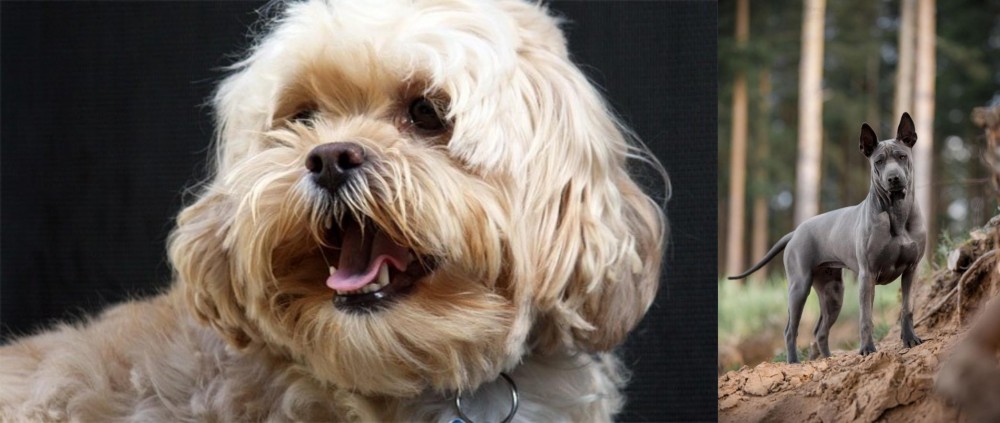 Lhasapoo is originated from United States but Thai Ridgeback is originated from Thailand. Lhasapoo may grow 33 cm / 12 inches shorter than Thai Ridgeback. Lhasapoo may weigh 28 kg / 61 pounds lesser than Thai Ridgeback. Both Lhasapoo and Thai Ridgeback has almost same life span. Both Lhasapoo and Thai Ridgeback has same litter size. Both Lhasapoo and Thai Ridgeback requires Moderate Maintenance.
Lhasapoo is originated from United States but Thai Ridgeback is originated from Thailand. Lhasapoo may grow 33 cm / 12 inches shorter than Thai Ridgeback. Lhasapoo may weigh 28 kg / 61 pounds lesser than Thai Ridgeback. Both Lhasapoo and Thai Ridgeback has almost same life span. Both Lhasapoo and Thai Ridgeback has same litter size. Both Lhasapoo and Thai Ridgeback requires Moderate Maintenance.
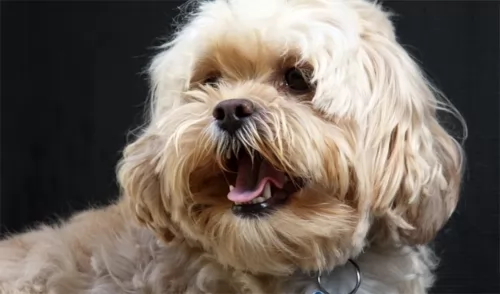 Such a cute, cuddly teddy bear of a dog is popular with everyone who just wants a wonderful canine companion.
Such a cute, cuddly teddy bear of a dog is popular with everyone who just wants a wonderful canine companion.
Both the Lhasa Apso and the Poodle are ancient dog breeds and they are the two breeds that have been used to bring about the Lhasapoo. The Poo has been bred to essentially be an indoor dog.
It would appear as though the Lhasapoo was developed in the United States of America, as in 1933, a pair was given to an American traveler who developed a kennel.
 Until recently the Thai Ridgeback was not known outside of its native land. However, after being recently recognized as a standard breed, the dogs are getting some notice from the western world. They are one of three known ridgeback breeds with the ridge running the opposite direction of the rest of her fur. The other breeds with this characteristic are the better known Rhodesian Ridgeback and the even lesser known Phu Quoc Ridgeback.
Until recently the Thai Ridgeback was not known outside of its native land. However, after being recently recognized as a standard breed, the dogs are getting some notice from the western world. They are one of three known ridgeback breeds with the ridge running the opposite direction of the rest of her fur. The other breeds with this characteristic are the better known Rhodesian Ridgeback and the even lesser known Phu Quoc Ridgeback.
The Thai Ridgeback is believed to have originated in eastern Thailand but there is no documentation of their actual history. The breed is thought to be descended from the Funan Ridgeback based on a genetic hypothesis. It is thought that the same Funan Ridgeback is an ancestor od the Phu Quoc Dog. This Funan Ridgeback lived over a century ago. Along with the Rhodesian Ridgeback, all have a common ridgebearing ancestor.
It is still unknown where the original ridge came from but it has been shown that all of the ridgeback dogs have the same genetic mutation and even though the Rhodisian is from Africa, there is not a parallel mutation. The Thai Ridgeback is an active, energetic, tough dog. He is loyal, intelligent, and has great jumping ability.
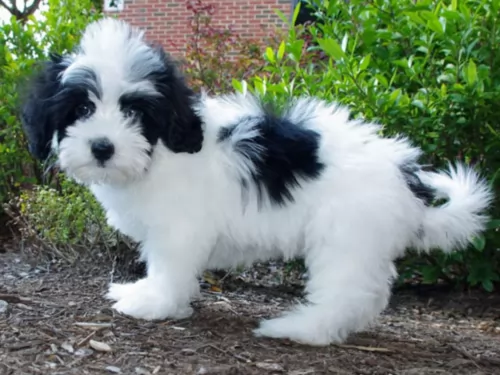 The Lhasapoo is a mix of Poodle and Lhasa Apso. He is a small dog standing between 25–28 cm in height and weighing 4 – 6kg.
The Lhasapoo is a mix of Poodle and Lhasa Apso. He is a small dog standing between 25–28 cm in height and weighing 4 – 6kg.
Known as a designer breed, his small size allows him to adapt to life in the city or to the countryside. He is such a cute little dog with his alert face, his bright brown eyes, short legs and floppy ears.
His coat is thick and dense and can be curly or fairly straight. It comes in a number of solid colors – apricot, tan, cream, brown, white and black or he can be bi-color – any of these colors mixed with white. In fact, as a crossbreed he can inherit the looks of either dogs – the Poodle or Lhasa Poo. Because he has poodle in him, these dogs are sometimes spoken about as being hypoallergenic.
Small and gentle in nature, the Lhasapoo makes a splendid pet and companion for everyone. He is such an amicable small dog, getting on well with both children and other pets in the home.
You can’t really tell what kind of a dog he’ll turn out to be in terms of his character, because he can be quite aloof if the Lhasa side of him is stronger or he could be playful and friendly if the Poodle side of him is stronger.
 The breed is medium in size and muscular in body. They have a wedge shaped head, a short coat that is smooth and pricked, triangular ears. The ridge on his back is pronounced as the hair grows away from the rest of the coat from the hips to the withers. Puppies can be born with or without the ridge. They are extremely agile. With what is often called a sword tail being carried up, the Ridgeback has wrinkles on his forehead, a black tongue or the tongue has black marks, and almond shaped eyes.
The breed is medium in size and muscular in body. They have a wedge shaped head, a short coat that is smooth and pricked, triangular ears. The ridge on his back is pronounced as the hair grows away from the rest of the coat from the hips to the withers. Puppies can be born with or without the ridge. They are extremely agile. With what is often called a sword tail being carried up, the Ridgeback has wrinkles on his forehead, a black tongue or the tongue has black marks, and almond shaped eyes.
The coat sheds minimally and is dense, while the eyes are usually brown – in blue dogs they can be amber. The color of the coat is fawn, red, black or blue with a black mask on the reds. There are 8 different ridge patterns: Feather, violin, saddleback, needle, arrow, bowling pin, lute, and leaf. The broader the ridge the better the dog is considered for show.
There are two epistatic genes that determine the ridge and its size. The more genes of this type the individual dog has, the broader the ridge will be. There must be a dominant gene for the ridge to appear at all.
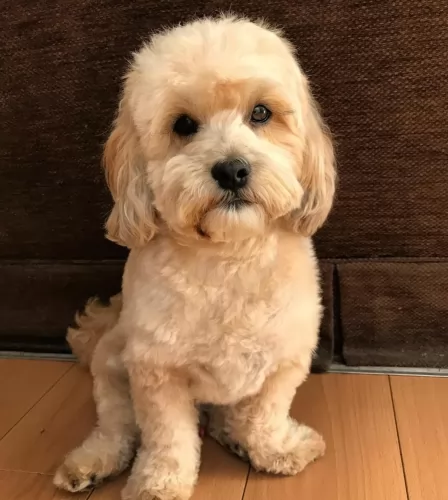 The Lhasapoo is a crossbreed, so you never know what you’re actually going to get – a little bit of Lhasa or a little bit of Poodle.
The Lhasapoo is a crossbreed, so you never know what you’re actually going to get – a little bit of Lhasa or a little bit of Poodle.
One thing is for sure though – you’re going to get the cutest little pet ever. He is a friendly, affectionate dog, but the Lhasa side of him makes him wary of strangers, making him an excellent watchdog.
They have a moderate activity levels and will adapt easily to life in the city or in the countryside, but they will need a walk every day to ensure he doesn’t become unfit and obese.
Lhasapoo puppies are adorable but every cute puppy grows into an adult. Then it’s time to show you’re a responsible dog owner by continuing to love and care for your adult Lhasapoo so that he becomes the wonderful companion he is designed to be.
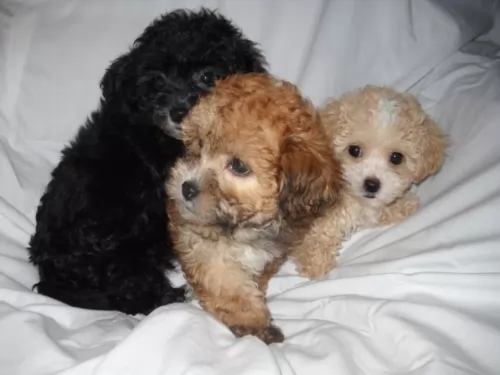 All dogs have the potential to become ill but when you give your dog the best chance to eat well and he is loved and cherished, he can live a long life.
All dogs have the potential to become ill but when you give your dog the best chance to eat well and he is loved and cherished, he can live a long life.
The Lhasapoo can live to be 15 years of age if you treat him well and ensure that he has a healthy diet. Of course as a crossbreed, his chances of developing inherited diseases is limited.
Watch out for Bloat, particularly if your pet gobbles up a large bowl of food. It is better to feed him 2 smaller meals a day. There are some time-releasing food bowls available for pets to encourage slower eating.
With Bloat, you’ll notice your pet’s stomach is swollen up. Complications set in when the stomach turns or twists as fluid and air can’t escape. Your dog will also be restless, drooling and trying to vomit. Bloat is a life-threatening illness.
This can be a complication from disease or medications even. It is important to keep your pet’s teeth healthy as chronic kidney disease can be caused by dental disease too. Bacteria from the diseased teeth and gums enters bloodstream and damages vital organs like the kidneys.
 With such a mysterious origin, there are not a lot of documented episodes of genetic illness as the breed has been isolated in Thailand and natural selection has driven reproduction. There are only a few issues that they are genetically predisposed to. These include:
With such a mysterious origin, there are not a lot of documented episodes of genetic illness as the breed has been isolated in Thailand and natural selection has driven reproduction. There are only a few issues that they are genetically predisposed to. These include:
• Dermoid Sinus – this is a genetic skin condition known as pilonidal sinus as well. This is a defect in the neural tube and the sinus might be removed. If the sinus is wrapped around the spinal cord and cannot be removed it can be tied off.
• Bloat – can be terminal if not treated as soon as possible. Bloat is a distension of the stomach and intestines which can twist and tangle, killing the dog almost immediately without veterinary attention.
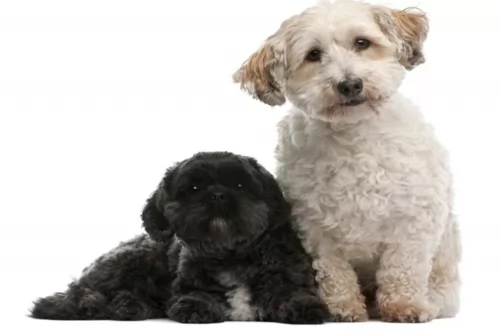 The Lhasapoo is a dog breed that likes to spend time indoors. Because of his looks, his human family members will no doubt be vying for his attention and playing indoor games with him. It will do him good to get out for a walk every day as this gives him the chance to sniff around and smell different things and experience life outside his home.
The Lhasapoo is a dog breed that likes to spend time indoors. Because of his looks, his human family members will no doubt be vying for his attention and playing indoor games with him. It will do him good to get out for a walk every day as this gives him the chance to sniff around and smell different things and experience life outside his home.
The Lhasapoo isn’t a big eater and he will require top quality food for small breeds. He isn’t a big meat eater so a tiny bit of cooked chicken, rice and vegetables chopped up nicely and added to his kibble from time to time will keep him healthy and happy.
Being the crossbreed that he is, you can’t be too sure about the type of coat your Lhasapoo will have. It can be curly, wavy or straight. Most inherit curls.
A Lhasapoo coat looks wonderful when it has been professionally groomed, and then in between grooming, his coat will need to be brushed to prevent tangling. While you’re brushing him, check his eyes too. Sometimes he can develop tear stains beneath the eyes and you can wipe gently around his eyes.
Other grooming for your cute little dog includes having his nails clipped as well as checking inside the ears for infection. Excess wax and dirt can result in an ear infection. You’ll notice your pet shaking his head, the insides of his ears might be red and he wants to scratch his ears. Get him to the vet who will show you how to keep his ears clean and dry.
Also, brush his teeth with special canine toothbrush and toothpaste. Dental disease won’t only damage his teeth, it can cause problems with other parts of the body too.
 1. Feeding the Puppy - Don’t over feed the puppy as they are inclined to become obese. Feed a high quality protein rich puppy for medium breeds. Feed in 3-4 smaller meals per day. As he grows be aware of bloat possibilities.
1. Feeding the Puppy - Don’t over feed the puppy as they are inclined to become obese. Feed a high quality protein rich puppy for medium breeds. Feed in 3-4 smaller meals per day. As he grows be aware of bloat possibilities.
2. Feeding the adult dog - The risk of bloat is even greater in the adult and so is the risk of obesity. Don’t feed large meals and don’t feed before or after strenuous exercise. Feed in 2 smaller meals per day.
4. Games and Exercises – Energetic and needs serious exercise. She loves to swim, retrieve, hike, hunt, and catch frisbees. Likes search and rescue and guard dog work.